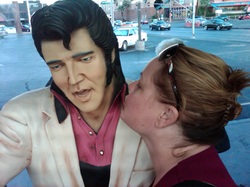Blog |
|
Michael Jackson and Elvis:
The death of Michael Jackson shocked and devastated me, as I am sure it did most of the world. I was in Memphis when I heard, doing research on Elvis for the new Cirque du Soleil show that I am performing in. Cirque flew the entire cast (over 80 of us) to Memphis to soak up the true Elvis experience. For three days, we did nothing but listen to amazing live music, eat fantastic food, and absorb the history of one of the greatest cities I’ve ever been to. The first thing I saw when I stepped off the plane in Memphis is a store in the airport completely dedicated to selling Elvis souvenirs. Little did I know, that was just the beginning… Memphis loves Elvis! You can buy just about anything with Elvis’ face on it-clothing, jewelry, a vile of Elvis’ sweat, and even Elvis toilet seat covers! We had the opportunity to meet with members of the Memphis Mafia, Elvis’ entourage, who worked for him, protected him and loved him dearly. They encouraged us to look at the positive things about Elvis’ life and to focus on his creative genius and generosity. Jerry Schiller, one of Elvis’ closest friends, recounted how he thought it was Elvis’ lack of creative control over his career that lead him down the path of self destruction. As I toured Graceland, I could not help but think of the demons that might have lead to the untimely deaths of both Elvis and Michael Jackson; artists who were considered musical genius’. What is genius? According to Wikipedia, a genius is “…one who possesses great intelligence and remarkable abilities in a specific subject or shows an exceptional natural capacity of intellect and/or ability, especially in the production of creative and original work, something that has never been seen or evaluated previously. Traits often associated with genius include strong individuality, imagination, uniqueness, and innovative drive.” The truth is that artists, especially those deemed a genius, are afraid. They are afraid to fail, especially if they achieved greatness and fame early on in life. Is it a rational fear that they will fail since they have already reached a level of fame that seemed somewhat unreachable to them in the beginning of their careers? Is it rational to be afraid of the work that they feel they were put on this earth to do? Artists, in general, have the reputation of being mentally, emotionally and financially unstable. As a society, we have made the association between creativity and suffering, and have accepted as a rule that it will always ultimately lead to anguish. “Eat, Pray, Love” Author Elizabeth Gilbert's book "Eat, Pray, Love" was so successful that everyone worried if she'd ever be able to repeat that creative performance. Given the pitfalls associated with being an artist (especially a writer), she found herself in the position to protect herself from these accepted rules and try to create a healthy distance between herself, her work, and what others might think about it. The concern led Gilbert to investigate how past cultures and societies handled creative people, to see if they had a saner way of helping them to manage the inherit emotional risks of creativity. Her search led her to ancient Greek culture and the realization that people did not happen to believe that creativity came from human beings. People believed that creativity was this “divine attendant spirit that came to human beings from some distant and unknowable source for distant and unknowable reasons”. The Greeks referred to these spirits of creativity as “deamons”. Socrates believed that he had a deamon who spoke wisdom to him from afar. The Romans had a similar idea but they called that sort of disembodied creative spirit a “genius”. They believed that a genius is “a sort of magical divine entity who was believed to literally live in the walls of an artists studio, who would come out and sort of assist the artist with their work and would shape the outcome of that work.” Voila! A physiological construct to protect Ms. Gilbert (and other artists) from the results of thier work. Renaissance Smenaissance! She goes on to say that this construct was indeed the way that people thought in the West for a really long time until the Renaissance came along and everything changed. We had this big idea to put the human being at the center of the universe, above all Gods and mysteries, and suddenly there was no more room for the mystical creatures serving as our muses. People started to believe that creativity came completely from the individual and started referring to people as “genius” instead of “having a genius”. According to Ms. Gilbert, “that has proved to be way too much responsibility for one human being (especially one with a fragile human psyche) to handle. It can completely warp and distort egos and it creates all of these unmanageable expectations about performance.” Has the pressure of our modern definition of genius been killing off our artists for the last 500 years? What if we adopted this ancient construct today? How would it have effected Elvis Presley and Michael Jackson’s untimely deaths? My guess is that it would have helped them to release the heavy anxiety around the creation of a project and allowed them to enjoy their process and to be less tormented. So what do you say-do you believe in fairies? Written by Che’Rae Adams for NOHOARTSDISTRICT.COM June 2009
2 Comments
|
by Che'Rae AdamsProducing Artistic Director of the LAWC Archives
July 2015
Categories |


 RSS Feed
RSS Feed